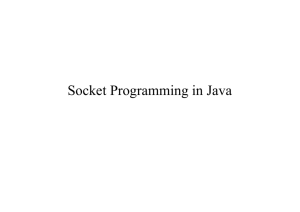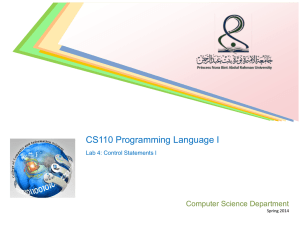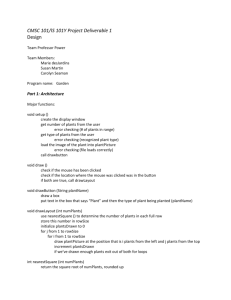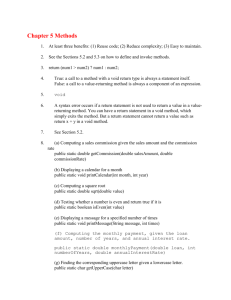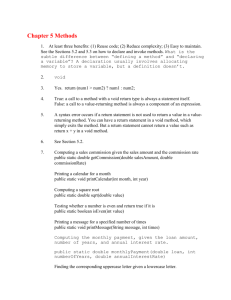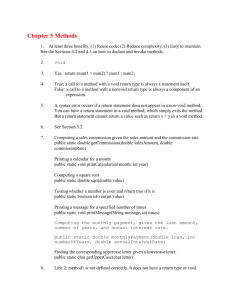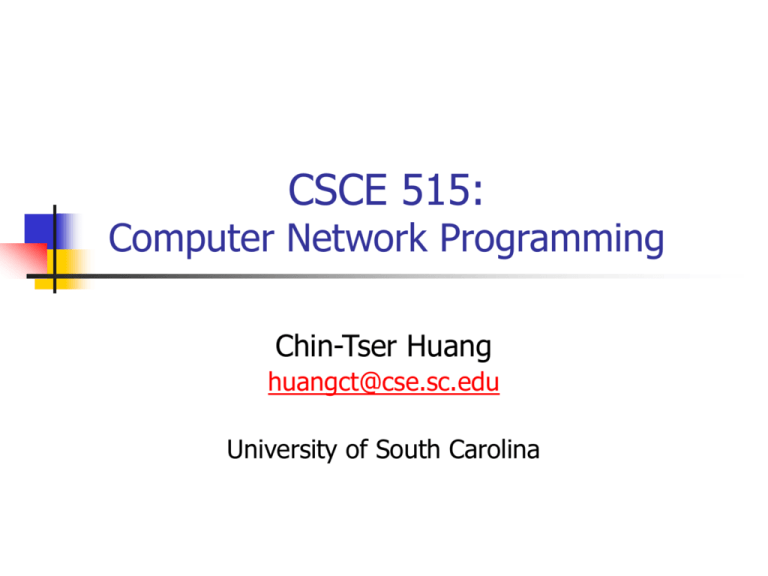
CSCE 515:
Computer Network Programming
Chin-Tser Huang
huangct@cse.sc.edu
University of South Carolina
More on Project 1
Both username and password are casesensitive
Server sends acknowledgment to client no
matter the received username is good or not
Make your program compilable on Unix/Linux
machines
Multithreaded server will get one bonus point
Plagiarism will not be tolerated!
1/27/2004
2
Something on Exam 1
To be held in class on March 4, 2004
(5:30pm-7pm)
No excuse will be accepted
If any substitute exam is really
necessary, it will be MUCH HARDER
than original exam
1/27/2004
3
UDP Sockets in Java
Use class DatagramPacket and class
DatagramSocket
Both client and server use
DatagramSocket to send and receive
DatagramPacket
1/27/2004
4
Class DatagramPacket
Constructors
DatagramPacket(byte buffer[], int length)
DatagramPacket(byte buffer[], int length,
InetAddress address, int port)
1/27/2004
5
Class DatagramPacket
Methods
void setAddress(InetAddress address)
InetAddress getAddress()
void setPort(int port)
int getPort()
void setData(byte[] buffer)
byte[] getData()
void setLength(int length)
int getLength()
1/27/2004
6
Class DatagramSocket
Constructors
DatagramSocket() throws SocketException
DatagramSocket(int port) throws SocketException
DatagramSocket(int port, InetAddress local) throws
SocketException
1/27/2004
7
Class DatagramSocket
Methods
void close() throws IOException
void connect(InetAddress address, int port) throws
SocketException
void disconnect()
void send(DatagramPacket packet) throws IOException
void receive(DatagramPacket packet) throws IOException
1/27/2004
8
Class DatagramSocket
Methods
InetAddress getInetAddress()
int getPort()
InetAddress getLocalAddress()
int getLocalPort()
void setSoTimeout(int timeout) throws SocketException
int getSoTimeout() throws SocketException
void setSendBufferSize(int size) throws SocketException
int getSendBufferSize() throws SocketException
void setReceiveBufferSize(int size) throws SocketException
int getReceiveBufferSize() throws SocketException
1/27/2004
9
Class DatagramSocket
Exceptions
IOException
SecurityException
1/27/2004
10
Receiving UDP Packets
DatagramSocket socket = new DatagramSocket(port);
byte buffer[] = new byte[65508];
DatagramPacket packet = new DatagramPacket(buffer, buffer.length);
socket.receive(packet);
InetAddress fromAddress = packet.getAddress();
int fromPort = packet.getPort();
int length = packet.getLength();
byte[] data = packet.getData();
// …
socket.close();
1/27/2004
11
Sending UDP Packets
DatagramSocket socket = new DatagramSocket();
DatagramPacket packet = new DatagramPacket
(data, data.length, InetAddress.getByName(“www.nsa.gov”), 1728);
socket.send(packet);
socket.close();
1/27/2004
12
A UDP Echo Client Example
Send echo string to server
Block on receive() for up to 3 seconds
Retry for up to 5 times if reply is not
received before timeout
Terminate the client
1/27/2004
13
UDPEchoClientTimeout.java
/* * TCP/IP Sockets in Java * Kenneth Calvert, Michael Donahoo *
Morgan Kaufmann Publishers; ISBN 1558606858 * *
http://cs.ecs.baylor.edu/~donahoo/practical/JavaSockets/textco
de.html* * Copyright (c) 2002 Kenneth Calvert, Michael
Donahoo ; * all rights reserved; see license.txt for details. */
import java.net.*;
import java.io.*;
public class UDPEchoClientTimeout {
private static final int TIMEOUT = 3000; // Resend timeout
private static final int MAXTRIES = 5;
// Maximum
retransmissions
// public static void main (String args[]) …
}
1/27/2004
14
Method main
public static void main(String[] args) throws IOException {
if ((args.length < 2) || (args.length > 3)) // Test for correct # of args
throw new IllegalArgumentException("Parameter(s): <Server> <Word> [<Port>]");
InetAddress serverAddress = InetAddress.getByName(args[0]); // Server address
// Convert input String to bytes using the default character encoding
byte[] bytesToSend = args[1].getBytes();
int servPort = (args.length == 3) ? Integer.parseInt(args[2]) : 7;
DatagramSocket socket = new DatagramSocket();
socket.setSoTimeout(TIMEOUT); // Maximum receive blocking time (milliseconds)
DatagramPacket sendPacket = new DatagramPacket(bytesToSend, // Sending packet
bytesToSend.length, serverAddress, servPort);
DatagramPacket receivePacket =
// Receiving packet
new DatagramPacket(new byte[bytesToSend.length], bytesToSend.length);
…
1/27/2004
15
Method main (cont’d)
int tries = 0;
// Packets may be lost, so we have to keep trying
boolean receivedResponse = false;
do {
socket.send(sendPacket);
// Send the echo string
try {
socket.receive(receivePacket); // Attempt echo reply reception
if (!receivePacket.getAddress().equals(serverAddress)) // Check source
throw new IOException("Received packet from an unknown source");
receivedResponse = true;
} catch (InterruptedIOException e) { // We did not get anything
tries += 1;
System.out.println("Timed out, " + (MAXTRIES-tries) + " more tries...");
}
} while ((!receivedResponse) && (tries < MAXTRIES));
if (receivedResponse)
System.out.println("Received: " + new String(receivePacket.getData()));
else
System.out.println("No response -- giving up.");
}
socket.close();
1/27/2004
16
A UDP Echo Server Example
Construct a DatagramSocket specifying
local port and (optionally) local address
Communicate with client by receiving
and sending DatagramPackets
Terminate server when finished
1/27/2004
17
UDPEchoServer.java
/* * TCP/IP Sockets in Java * Kenneth Calvert, Michael Donahoo *
Morgan Kaufmann Publishers; ISBN 1558606858 * *
http://cs.ecs.baylor.edu/~donahoo/practical/JavaSockets/textco
de.html* * Copyright (c) 2002 Kenneth Calvert, Michael
Donahoo ; * all rights reserved; see license.txt for details. */
import java.net.*;
import java.io.*;
public class UDPEchoServer {
private static final int ECHOMAX = 255; // Maximum size of echo
datagram
// public static void main (String args[]) …
}
1/27/2004
18
Method main
public static void main(String[] args) throws IOException {
if (args.length != 1) // Test for correct argument list
throw new IllegalArgumentException("Parameter(s): <Port>");
int servPort = Integer.parseInt(args[0]);
DatagramSocket socket = new DatagramSocket(servPort);
DatagramPacket packet = new DatagramPacket(new byte[ECHOMAX], ECHOMAX);
}
for (;;) { // Run forever, receiving and echoing datagrams
socket.receive(packet);
// Receive packet from client
System.out.println("Handling client at " +
packet.getAddress().getHostAddress() + " on port " + packet.getPort());
socket.send(packet);
// Send the same packet back to client
packet.setLength(ECHOMAX); // Reset length to avoid shrinking buffer
}
/* NOT REACHED */
1/27/2004
19
Blocking
Program cannot move forward until
request for data is satisfied
Many calls may block
accept()
read(), receive()
write()
1/27/2004
20
Dealing with Blocking Calls
Write a non-blocking server
Use available()
Use setSoTimeout()
Write a multithreaded server
1/27/2004
21
A Non-blocking Server Example
Accept two client connections
Loop to echo data between two clients
Use available() to simulate non-blocking
1/27/2004
22
NBServer.java
/* * Java Network Programming, Second Edition * Merlin Hughes,
Michael Shoffner, Derek Hamner * Manning Publications
Company; ISBN 188477749X * * http://nitric.com/jnp/ * *
Copyright (c) 1997-1999 Merlin Hughes, Michael Shoffner, Derek
Hamner; * all rights reserved; see license.txt for details. */
import java.net.*;
import java.io.*;
public class NBServer {
static InputStream in0, in1;
static OutputStream out0, out1;
}
// public static void main (String[] args) throws IOException …
1/27/2004
23
Method main
public static void main (String[] args) throws IOException {
if (args.length != 1)
throw new IllegalArgumentException ("Syntax: NBServer <port>");
try {
accept (Integer.parseInt (args[0]));
int x0, x1;
while (((x0 = readNB (in0)) != -1) &&
((x1 = readNB (in1)) != -1)) {
if (x0 >= 0)
out1.write (x0);
if (x1 >= 0)
out0.write (x1);
}
} finally {
System.out.println ("Closing");
close (out0);
close (out1);
}
}
1/27/2004
24
Method close
static void close (OutputStream out) {
if (out != null) {
try {
out.close ();
} catch (IOException ignored) {
}
}
}
// static void accept (int port) throws IOException …
// static int readNB (InputStream in) …
1/27/2004
25
Method accept
static void accept (int port) throws IOException {
System.out.println ("Starting on port " + port);
ServerSocket server = new ServerSocket (port);
try {
System.out.println ("Waiting..");
Socket client0 = server.accept ();
System.out.println ("Accepted from " + client0.getInetAddress ());
in0 = client0.getInputStream ();
out0 = client0.getOutputStream ();
out0.write ("Welcome. Please wait.\r\n".getBytes ("latin1"));
System.out.println ("Waiting..");
Socket client1 = server.accept ();
System.out.println ("Accepted from " + client1.getInetAddress ());
in1 = client1.getInputStream ();
out1 = client1.getOutputStream ();
out1.write ("Welcome.\r\n".getBytes ("latin1"));
out0.write ("Proceed.\r\n".getBytes ("latin1"));
} finally {
server.close ();
}
}
1/27/2004
26
Method readNB
static int readNB (InputStream in) throws IOException {
if (in.available () > 0)
return in.read ();
else
return -2;
}
1/27/2004
27
Use Socket Timeout
client0.setsoTimeout (10);
client1.setSoTimeout (10);
static int readNB (InputStream in) throws IOException {
try {
return in.read ();
} catch (InterruptedIOException ex) {
return -2;
}
}
1/27/2004
28
Next Class
Multithreading
Link layer
Read JNP Ch. 16, TI Ch. 2
1/27/2004
29

